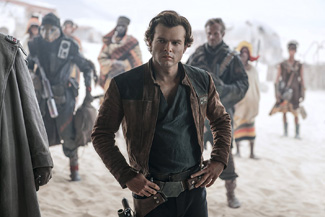|
|
Movie Review - Solo: A Star Wars StoryBy Matthew HuntleyJune 12, 2018
Amidst this chaos, a mid-20s Solo is able to finagle a small amount of coaxium and believes this will be his and his girlfriend Qi'ra's (Emilia Clarke) bargaining chip off the dark, dreary, and crime-infested planet of Corellia. Han's plan almost works, as only he is able to bypass security and catch a departing transport when he signs up to be a pilot for the Empire's Imperial Army. Though he promises Qi'ra he'll come back, their reunion will be a long time coming after Han is demoted to the infantry for insubordination. While dodging laser beams in the swamp-ish wasteland of Mimban, he meets a band of thieves led by Beckett (Woody Harrelson), who, along with his strong-willed lady-friend, Val (Thandie Newton), and smart-mouthed alien pilot, Rio (voice of Jon Favreau), plans on stealing a ship so they can pull off a major heist atop a snowy mountain, where a whole train-cart full of coaxium is traveling in the most dangerous conditions. Naturally, Han wants in, seeing it as an prime opportunity to score enough loot so he can get to Corellia and rescue Qi'ra. Without giving away too much of the plot away, the mountain heist (which is one of the movie's most exciting action sequences) goes fatally awry, and now Beckett and Han must team up and find another way to pay off Beckett's debt to Dryden Vos (Paul Bettany), the evil representative of the crime organization known as Crimson Dawn, whose head leader I will not reveal. As he willfully involves himself in this situation, Han discovers Qi'ra has actually become Vos's right-hand lieutenant but believes he can still win her back after he and Beckett propose a repayment plan to Vos that would have them stealing unrefined coaxium from a distant planet, with the risk being the coaxium could destabilize, explode and, of course, kill them and thousands of others. Han also comes to learn, throughout this new mission, that the value of coaxium goes beyond its use as a bargaining chip. To some people, it is the means by which the Empire gains power and continues to persecute. Han realizes that perhaps his dreams of “flying among the stars” shouldn't come at the fall of others and we begin to see snippets of the nobler and self-less side he displays in “A New Hope.” As Qi'ra tells him, “You're one of the good guys.” The plot, for the most part, is typical “Star Wars” stuff, replete with starship chases, laser battles, bargaining scenes in bars, “down-to-the-last-second” get-a-ways, tender moments of friendship and realization, etc., all fueled by standard-issue heroes, villains, double-crossers, and a would-be romance. It's a fair story, and it holds our attention, but it's not far removed from what we've seen time and again from this franchise. In fact, it seems the screenwriters were less concerned about creating original characters and giving them exciting things to do than they were about telling us how the “Episode IV” version of Han came to be. We learn, among other things: how Han acquired his last name; how he met Chewbacca, gave him the nickname “Chewy,” and eventually made him his best friend and co-pilot; how Han got a crash course in reckless flying; how Han first met Lando Calrissian (Donald Glover) and when he first set eyes on his beloved Millennium Falcon ship; how he learned to rotate a gun around his pointer finger; how he ended up on Tatooine and met a “big shot gangster” named Jabba the Hut; and ultimately how the Rebel Alliance began. And while all this information is mildly interesting, it's not something we were yearning to know, and so at the end of the day, the question “Solo” had me asking was, what was the point of what I just watched? I left the theater thinking it was harmless but mediocre, serviceably entertaining but not overly exciting. These are not reactions we're used to having (nor should we have) after seeing a “Star Wars” picture. Still, there are some good points worth mentioning. In addition to Ehrenreich, Donald Glover is outstanding as Calrissian. His performance is more in tune with what Billy Dee Williams brought to the table in “The Empire Strikes Back,” with his calculated beats, animated facial features, sly rhythm and busting self-assurance, but he nails it. We believe Glover is Calrissian and his and Ehrenreich's chemistry is one of the movie's highlights. I also liked the scene when Han first meets Chewy because we finally get to hear him speak Wookie, which is a treat. But I'm afraid these small merits aren't worth a trip to the theater. “Solo” leaves too much to be desired, both from its genre and the established “Star Wars” franchise. When I reviewed “Rogue One,” I mentioned my only hope for these “child” stories of the greater “parent” episodes was to bring new things to light we didn't already know. “Solo” tells us some things we didn't “officially” know, but we suspected them in the back of our minds, and so it seems the talent and resources the movie uses to verify them should have been applied to a more engaging, more risk-taking adventure. The filmmakers should know we want to see the “SW” mythology expand with original characters and fresh, intriguing details, not just be made heavier with ones that are already in place.
|

|
|
|

|
Thursday, October 31, 2024
© 2024 Box Office Prophets, a division of One Of Us, Inc.


